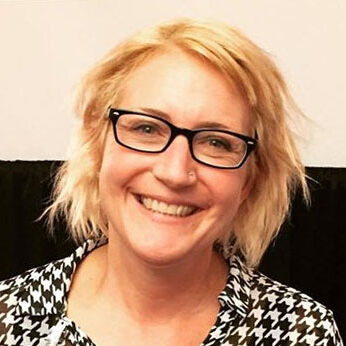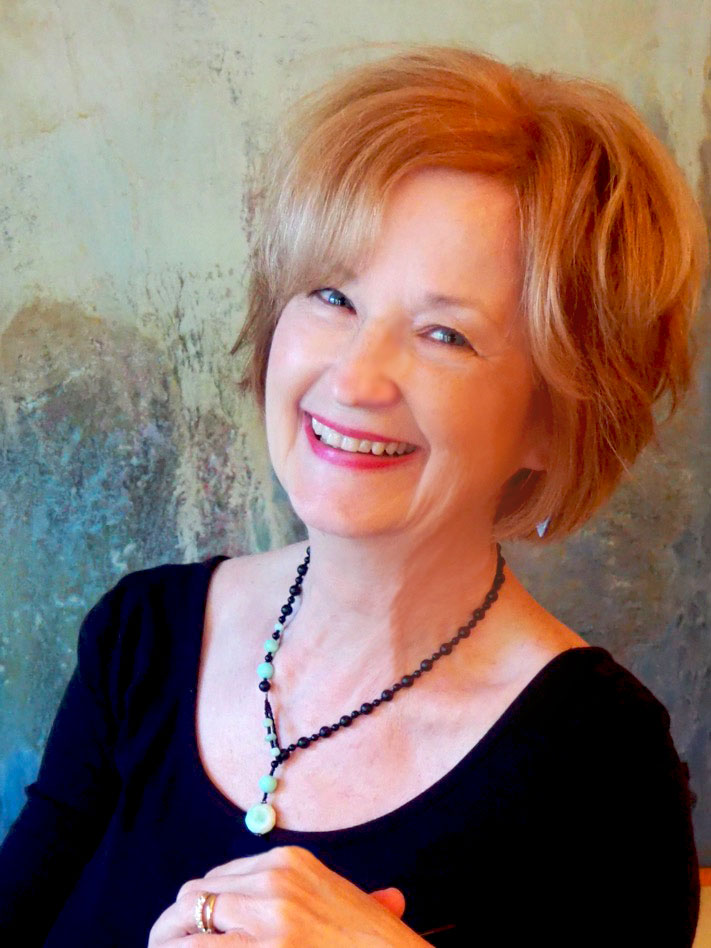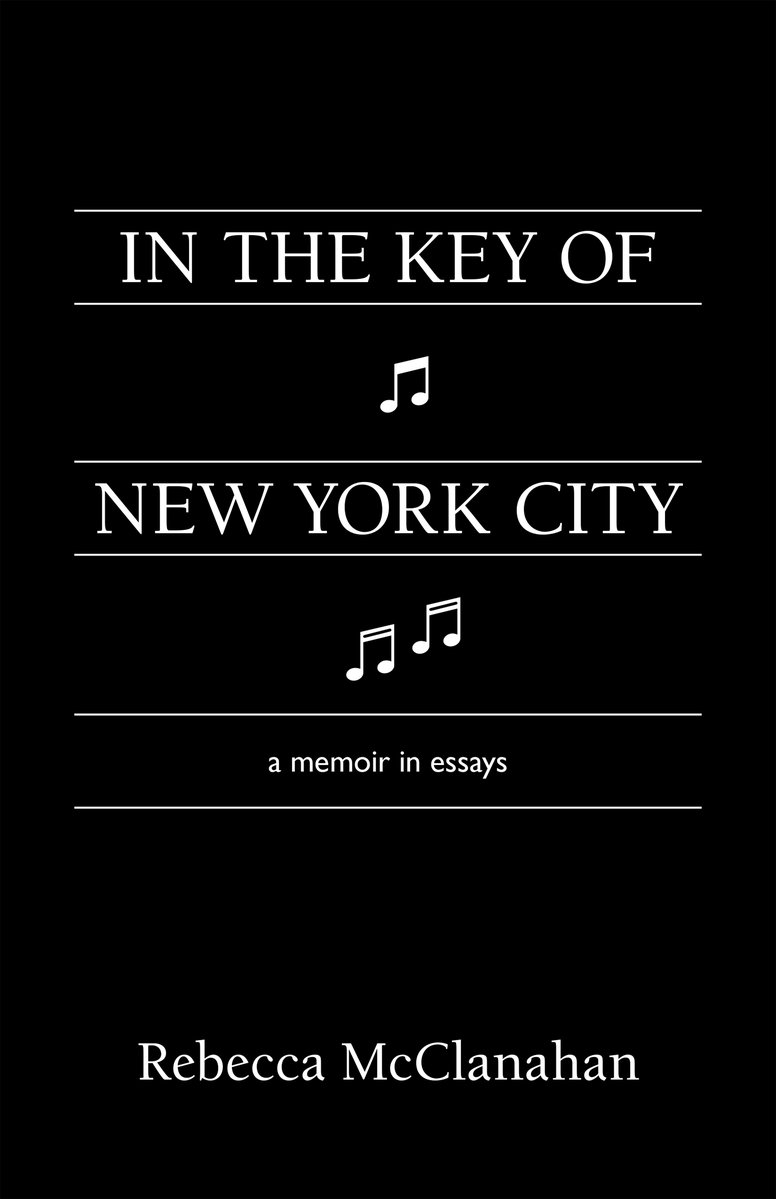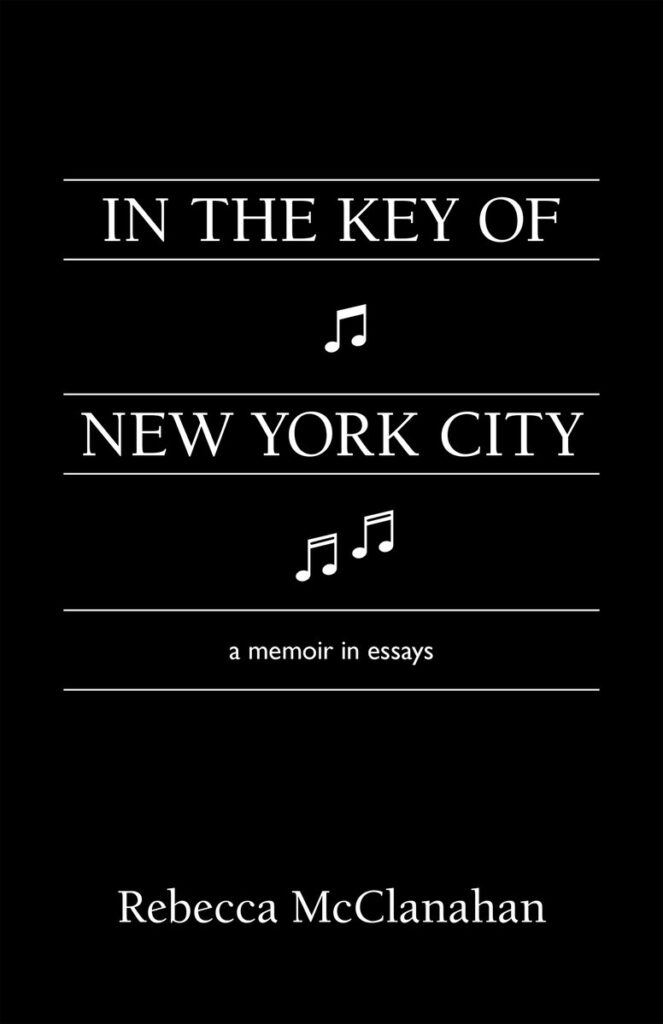Summer 2020
3
Storing What Remains:
An interview with Rebecca McClanahan
Sydney Elliott (2015), Managing Editor
Storing What Remains:
An interview with Rebecca McClanahan

Sydney Elliott
Managing Editor
Class of 2015
A PDF of In the Key of New York City: A Memoir in Essays by Rebecca McClanahan sits on my desk, held together with a big clip. The top page is stained with coffee and food and notes scribbled all over the surface: Squirrel, 9/11, cancer, God, cookies. When I first started reading the book, I had a trip to New York scheduled to present at a conference. It would be my first time there.
But as the country shut down, travel was cancelled, and New York became a spotlight of the pandemic, Rebecca’s book filled me with a sense of nostalgia for a city I’ve never been to. In the Key of New York City is perhaps Rebecca’s most intimate work. The stories interweave and bob like a heavily populated pedestrian street, and yet we are privy to the solitude of neighbors that inhabit apartments like ghosts. The pages capture and hold the days preceding and following 9/11, her cancer and recovery, her marriage, and the reading and writing that helped her survive it all.
A squirrel and box of mementos are frequent visitors. She wonders if the box will continue to follow her around, and what to discard and what to keep from the box. Rebecca stores these stories carefully; they will remain with me, and I hope to see the city that shaped this book. I was lucky enough to ask Rebecca some questions about the book’s publication and RWW.

Sydney Elliott: The release of your book has been postponed due to the pandemic. What are your plans currently for its release, and how are you feeling about what is happening in New York (and beyond)?

Rebecca McClanahan
Rebecca McClanahan: Oh, Sydney, I do hope you will get to see New York City someday, however changed it will be. As I suggest in the book’s introduction (an introduction I wrote two years before Covid-19 struck) life interrupts the memoir and the memoir interrupts the life. And because life moves in strange and unpredictable ways, the memoir runs panting behind the life but can never catch up. Yes, the book, which has been in process for nearly two decades, was originally scheduled to appear in May. But in March, as the release date grew close, I felt more and more that the timing was wrong. My feelings about the pandemic were raw and personal; they still are. I have two nieces and a baby great-niece in the city, along with friends and former students, and I worry for their safety and their livelihoods. Also, though In the Key of New York City is in many ways a love song to the city (music plays an important part in the book) given that several essays in the memoir are about 9/11, I was concerned that readers might feel I was equating that experience, terrible though it was, with the ongoing horror of Covid-19. So I was grateful when my editor agreed to move the release date to September 1. Perhaps by that time, some things may have improved in New York—and elsewhere—though it’s becoming more and more clear that large cities like New York are forever changed.
"My feelings about the pandemic were raw and personal; they still are. I have two nieces and a baby great-niece in the city, along with friends and former students, and I worry for their safety and their livelihoods."
SE: Can you tell us a little about the process of compiling the material for this book?
RM: I am smiling at the word “compiling.” (Hey, that rhymes!) If it had been a matter of merely gathering the essays under the same roof, I might have been a much younger woman when the book came into the world, ha! Actually, though I began writing the essays when we first moved to New York, only three years ago did I finally find the shape for the book and begin to revise—often with much violence. A memoir-in-essays is a tricky form. Though each essay should have a life of its own, when shaping a memoir-in-essays, the writer must consider how the essays talk to each other and build upon each other so that together they form something greater than the sum of their parts. For me, this involved making tough decisions not only about which essays to include (some of my favorites don’t appear in the book) but also about what final form the essays would take. Almost all of them had been previously published, but I rewrote parts of them, cut certain sections, and broke a few long essays into flash pieces and scattered them throughout the manuscript; I even dismantled the line breaks to a published poem and rewrote it as prose—because I felt that the scene described in the poem was integral to the memoir.


In the Key of New York City by Rebecca McClanahan
SE: I was struck as I read your book about how you deliver really hard topics with such grace...maybe it's hindsight?
RM: Hindsight? I’m not sure. Since I wrote the essays over a period of many years, they vary in terms of reflective distance. Most were written when I lived in New York, and some—especially the present tense, scene-propelled street and park pieces—place the narrator directly in the center of unfiltered experience. (For instance, I had already begun the 9/11 squirrel essay three days before the attacks, as a response to viewing the Salgado exhibit, and when I revised the essay months later, I kept the present tense quality of the earliest drafts.) Other essays employ spatial, temporal, and emotional distance. I’m honored that you use the word “grace” to describe how the hardest topics in the book are treated, though in all humility I don’t believe you can create grace; it is visited upon you—or it isn’t. I guess by “hard topics” you’re referring to the essays about 9/11, cancer, loneliness, and encounters with homeless people, along with the essays about the darkest years of my life, including the marital infidelity and separation that occurred thirteen years into our (now forty-years-and-counting) marriage. Though I often write about difficult personal experiences, I never publish these pieces until I have enough distance to understand their import and to test them against my moral obligation to the people I write about—including my earlier selves.
"Actually, though I began writing the essays when we first moved to New York, only three years ago did I finally find the shape for the book and begin to revise—often with much violence."
SE: What new projects are on the horizon?
RM: For the past seven years—ever since my husband and I began caring for my parents—I’ve been writing and publishing what I’m calling “caregrieving” pieces. I’ve presented a few of these during RWW readings. Some are very brief, almost like mini-plays, and some are long, braided narratives. I imagine that in time they might come together to form another memoir-in-essays. It depends on how life chooses to interrupt the ongoing, ever-changing story. It’s also possible that I might step away from this work-in-progress and re-enter community service or public-school teaching, if the need for volunteers and teachers becomes even more dire. All I can say at this point is that I will wait and see. See and wait. And try my best to move forward. Like nearly every other citizen in our world today, that’s my most important job now: to take care and carry on.
Join Rebecca virtually for her morning craft talk, When Life Interrupts the Writing, and her class, You Think "You" Got Problems? (The Expansive, Surprising, Useful, and Sometimes Pesky Second Person in Nonfiction). She will also be facilitating a Grad session, What's Next? The Writer's Ongoing Journey and will be reading from her memoir at one of the faculty evening readings.
Rebecca McClanahan’s most recent books are The Tribal Knot: A Memoir of Family, Community, and a Century of Change and a new edition of Word Painting: The Fine Art of Writing Descriptively. She has also published five books of poetry, two additional books of writing instruction, and The Riddle Song and Other Rememberings, winner of the Glasgow Award in nonfiction. McClanahan’s work has appeared in Best American Essays, Best American Poetry, The Georgia Review, The Kenyon Review, The Sun, and numerous anthologies. McClanahan, who received the Wood Prize from Poetry, a Pushcart Prize in Fiction, the Carter Prize for the Essay, and literary fellowships from New York Foundation for the Arts and the North Carolina Arts Council, was the 2015 Writer-in-Residence at Hollins University.
